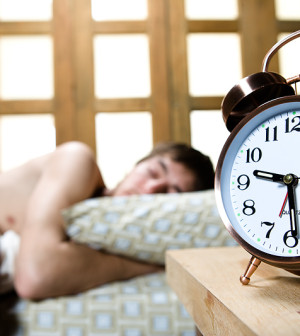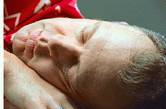- Could Your Grocery Store Meat Be Causing Recurring UTIs?
- Are You Making This Expensive Thermostat Error This Winter?
- Recognizing the Signs of Hypothyroidism
- 10 Strategies to Overcome Insomnia
- Could Artificial Sweeteners Be Aging the Brain Faster?
- Techniques for Soothing Your Nervous System
- Does the Water in Your House Smell Funny? Here’s Why
- Can a Daily Dose of Apple Cider Vinegar Actually Aid Weight Loss?
- 6 Health Beverages That Can Actually Spike Your Blood Sugar
- Treatment Options for Social Anxiety Disorder
Alcohol Before Bedtime Won’t Help Your Sleep, Study Finds


As many as one in five Americans turns to alcohol sometimes to help them fall asleep, but that can lead to sleep problems later in the night, a new study finds.
This is because alcohol hampers the brain’s system for regulating a person’s need for sleep, researchers found.
“The prevailing thought was that alcohol promotes sleep by changing a person’s circadian rhythm — the body’s built-in 24-hour clock,” study lead author Mahesh Thakkar, an associate professor and director of research in the neurology department at the University of Missouri School of Medicine, said in a university news release.
“However, we discovered that alcohol actually promotes sleep by affecting a person’s sleep homeostasis — the brain’s built-in mechanism that regulates your sleepiness and wakefulness,” Thakkar said.
Alcohol’s effect on sleep homeostasis can lead to poorer quality sleep, according to the study published recently in the journal Alcohol.
Study co-author Dr. Pradeep Sahota said, “Based on our results, it’s clear that alcohol should not be used as a sleep aid.” Sahota is chair of the neurology department at the University of Missouri School of Medicine.
“Alcohol disrupts sleep and the quality of sleep is diminished. Additionally, alcohol is a diuretic, which increases your need to go to the bathroom and causes you to wake up earlier in the morning,” Sahota explained in the news release.
Thakkar pointed out that sleep is an important area of study. “Approximately one-third of our life is spent sleeping. Coupled with statistics that show 20 percent of people drink alcohol to sleep, it’s vital that we understand how the two interact,” he said.
“If you are experiencing difficulty sleeping, don’t use alcohol. Talk to your doctor or a sleep medicine physician to determine what factors are keeping you from sleeping. These factors can then be addressed with individualized treatments,” Thakkar advised.
More information
The U.S. National Institute of Neurological Disorders and Stroke has more about sleep.
Source: HealthDay
Copyright © 2026 HealthDay. All rights reserved.










